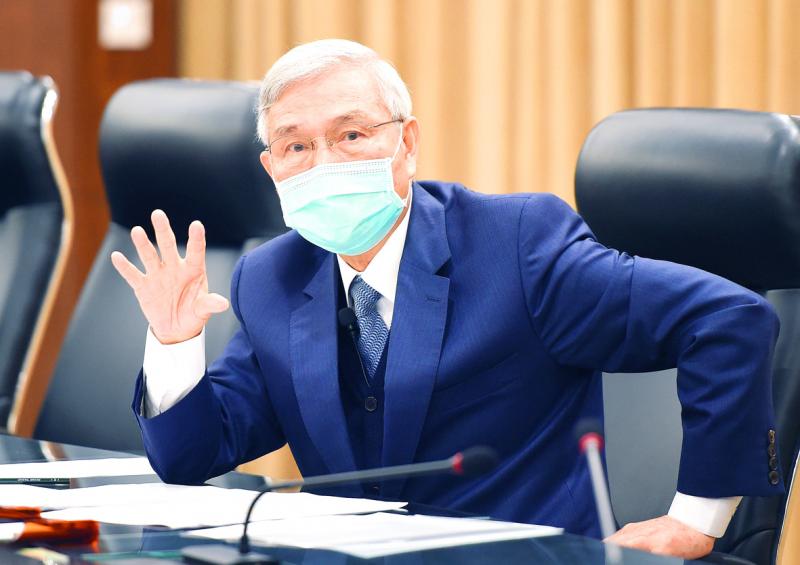The central bank yesterday tightened credit controls for real-estate financing after verbal warnings failed to rein in property price hikes linked to capital repatriation and loose lending.
It is the first time in a decade that the monetary policymaker has implemented credit controls directed at multiple homebuyers, land financing and lending for unsold houses.
Starting today, the loan-to-value (LTV) ratio would be capped at 60 percent for corporate buyers for their first property and drop to 50 percent for their second, the bank said.

Photo: Liao Chen-huei, Taipei Times
No grace period is allowed.
“The measures are targeted at corporate and individual property investors and will not affect first-time homebuyers or people with real demand or relocation needs,” central bank Governor Yang Chin-long (楊金龍) told an unscheduled news conference ahead of the quarterly board meeting on Thursday.
Housing prices have increased noticeably, especially in central and southern Taiwan, although the pace is not as drastic as in 2010, he said.
It is better to act now, if credit controls are necessary to reverse the trend, he added.
For individual buyers, the LTV ratio is set at 60 percent for their third home and no grace period is allowed, Yang said.
The LTV ratio for luxury homes remains unchanged at 60 percent, he added.
Clear and consistent LTV ratios might help banks carry out real-estate financing, as they currently have different standards, making it difficult to regulate, he said.
Some banks offer ultra-low interest rates, while others grant unreasonably long grace periods, it said.
As a result, real-estate lending reached 35.9 percent of banks’ total outstanding loans as of October, close to the historical peak of 37.9 percent, Yang said.
Global low-interest rates have driven some liquidity to the property market, while capital has also lent support, he said.
That explains why housing prices in the proximity of science parks in Hsinchu, Taichung and Tainan have risen, as have housing prices in rezoning areas nationwide, the central bank governor said.
Banks will have to limit land financing to 65 percent of their value and set aside 10 percent loans until after developers produce concrete development plans, Yang said, adding that the restriction is intended to prevent land hoarding.
Banks also have to cap loans for unsold homes at 50 percent of their value to avoid house-hoarding on the part of builders, he said, adding that some companies have overly high inventories.
The central bank would further tighten credit controls if the situation fails to improve, Yang said.

The Central Election Commission has amended election and recall regulations to require elected office candidates to provide proof that they have no Chinese citizenship, a Cabinet report said. The commission on Oct. 29 last year revised the Measures for the Permission of Family-based Residence, Long-term Residence and Settlement of People from the Mainland Area in the Taiwan Area (大陸地區人民在台灣地區依親居留長期居留或定居許可辦法), the Executive Yuan said in a report it submitted to the legislature for review. The revision requires Chinese citizens applying for permanent residency to submit notarial documents showing that they have lost their Chinese household record and have renounced — or have never

A magnitude 5.6 earthquake struck off the coast of Yilan County at 12:37pm today, with clear shaking felt across much of northern Taiwan. There were no immediate reports of damage. The epicenter of the quake was 16.9km east-southeast of Yilan County Hall offshore at a depth of 66.8km, Central Weather Administration (CWA) data showed. The maximum intensity registered at a 4 in Yilan County’s Nanao Township (南澳) on Taiwan’s seven-tier scale. Other parts of Yilan, as well as certain areas of Hualien County, Taipei, New Taipei City, Taoyuan, Hsinchu County, Taichung and Miaoli County, recorded intensities of 3. Residents of Yilan County and Taipei received

Taiwan has secured another breakthrough in fruit exports, with jujubes, dragon fruit and lychees approved for shipment to the EU, the Ministry of Agriculture said yesterday. The Animal and Plant Health Inspection Agency on Thursday received formal notification of the approval from the EU, the ministry said, adding that the decision was expected to expand Taiwanese fruit producers’ access to high-end European markets. Taiwan exported 126 tonnes of lychees last year, valued at US$1.48 million, with Japan accounting for 102 tonnes. Other export destinations included New Zealand, Hong Kong, the US and Australia, ministry data showed. Jujube exports totaled 103 tonnes, valued at

BIG SPENDERS: Foreign investors bought the most Taiwan equities since 2005, signaling confidence that an AI boom would continue to benefit chipmakers Taiwan Semiconductor Manufacturing Co’s (TSMC, 台積電) market capitalization swelled to US$2 trillion for the first time following a 4.25 percent rally in its American depositary receipts (ADR) overnight, putting the world’s biggest contract chipmaker sixth on the list of the world’s biggest companies by market capitalization, just behind Amazon.com Inc. The site CompaniesMarketcap.com ranked TSMC ahead of Saudi Aramco and Meta Platforms Inc. The Taiwanese company’s ADRs on Tuesday surged to US$385.75 on the New York Stock Exchange, as strong demand for artificial intelligence (AI) applications led to chip supply constraints and boost revenue growth to record-breaking levels. Each TSMC ADR represents